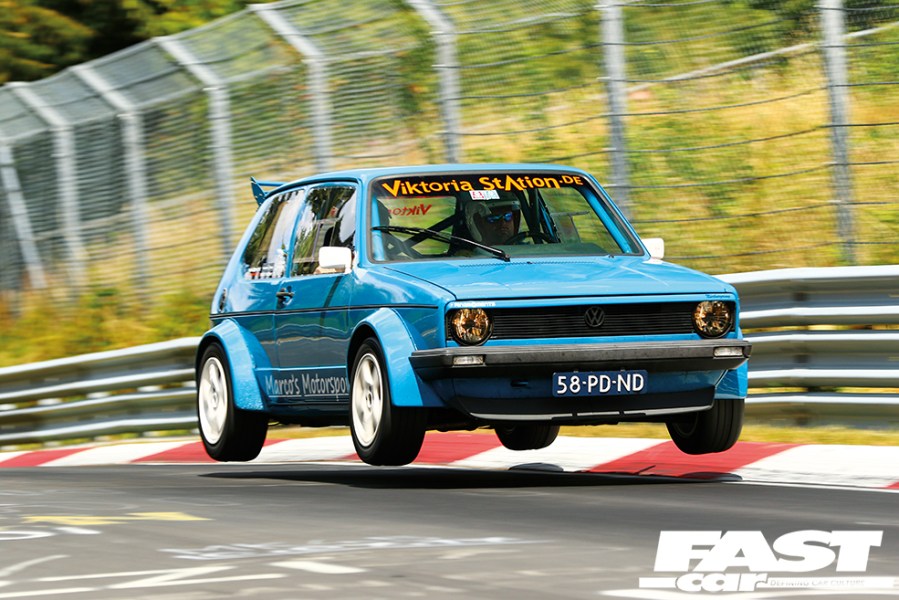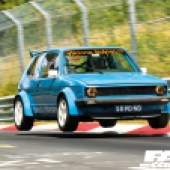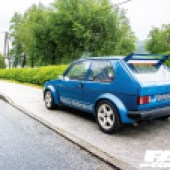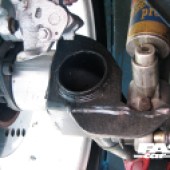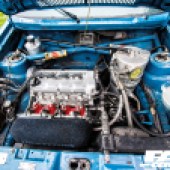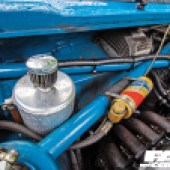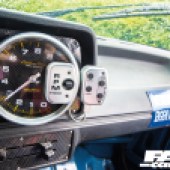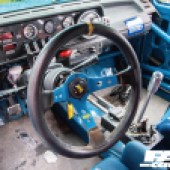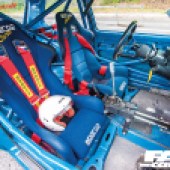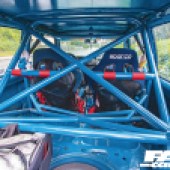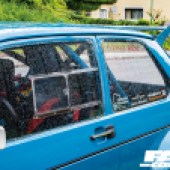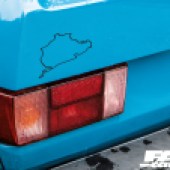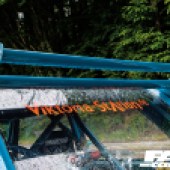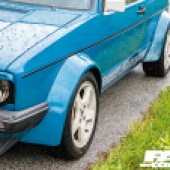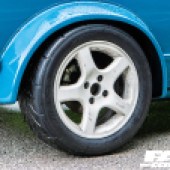The Golf that went Dutch, got re-registered and TÜV approved in Germany, and is now a forty-year-old tax-free ‘Ring legend. Here is Marco’s Mk1 Golf track car.
Feature from Performance VW. Words: Chris Eyre. Photos: Tony Matthews. Opening image: Oliver Kälke
A picture tells a thousand words’? Hmmmm. Balls out at Pflanzgarten, Nurgburgring, a foot in the air at 90mph, into a fourth-to-fifth gear right hander. The Nürburgring is full of motor racing legends but Touristenfahrten – public ‘tourist’ driving – has its own. Hands up who remembers the ‘Ring Mini Clubman van, star of many online videos in the Noughties? Well here’s another. So when Editor Roberts got in touch to say he’d pinned down Dutchman Marco Veldhuis’s Mk1 Golf track toy, the sense of anticipation was palpable. Dubbers from the Nineties know Marco anyway. We all know people by their cars, right? Or at least his previous car.
So who remembers a metallic black 16v G60 Mk2 Golf (PVW 10/01) that turned up to GTI International 2001 at TRL Crowthorne on 19″, five-spoke wheels? Well he’d made those centre-locking rims complete with hidden valves himself. Marco, a hydraulic engineer based in the east of Holland, who appears to be phased by nothing, quips: “My motto is ‘What you can’t buy, you can make!’” The stuff of legend and he still owns it.
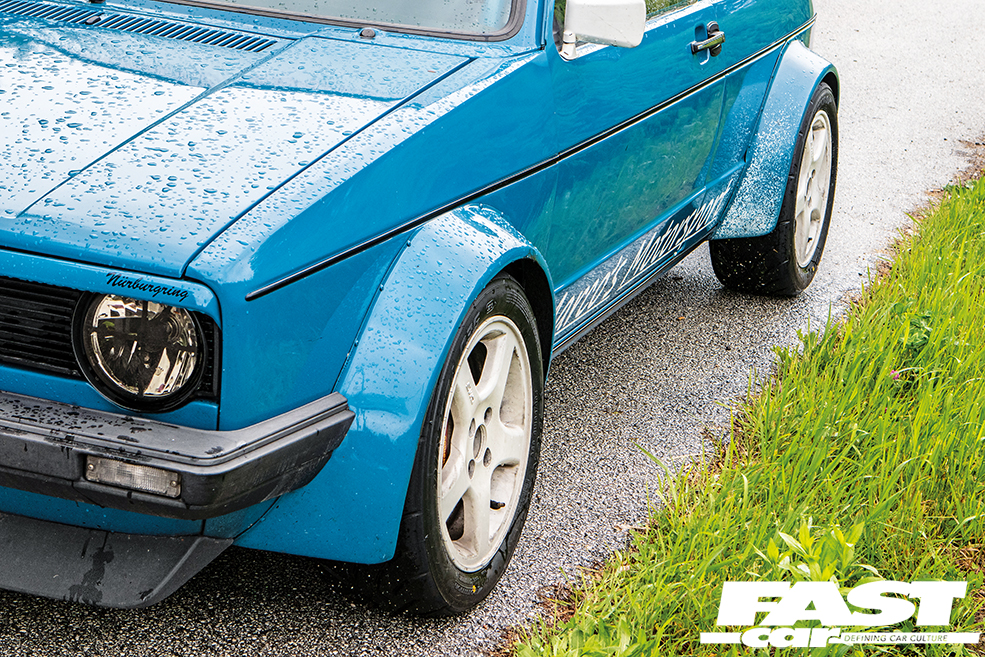
In parallel with the Mk2, Marco takes up the Mk1 Golf track car story; “In ’97 I started going with friends for day trips to the Nürburgring, until early 2000 when we started going with our club in Holland for a complete weekend.” Marco duly picked up an early grey 1979 Mk1 GTI: “In 2003 I bought the car in Germany with the normal 1.6-litre GTI engine and started driving the Nürburgring in October 2004. I ended up doing 102 laps in two weekends! So yeah that’s when my ‘sickness’ for the Nürburgring started! 550 Laps in 2005, I then changed the engine to an 1.8-litre 8v GTI, and drove again until the middle of 2006. After this the serious rebuild started…”
“I drove the body shell to Belgium for a ‘bath’ to get rid of the paint and underseal. I then seam welded the whole shell and installed a big roll cage and painted the car on my own in RAL5009 because we had our own machine paintshop. We picked this colour because we had four friends with Mk1s painted the same shade.” For some years they all had instantly-recognisable ‘Roma Tuning’ stickers on the sides, a former evenings hobby business started in 1998 doing G60 overhauls and engine building, run by mate ‘Robert and ‘Marco, hence the name.”
Draw up a wish-list tick-box spec of a Mk1 Golf track car, and you’ll find all or most of what you’re looking for already in the Dub Details side panel: A throttle-bodied 16-valve, six-speed dog ‘box, tubular wishbones, spherical joints everywhere, two-to-three-way dampers and a multi-point weld-in climbing frame.
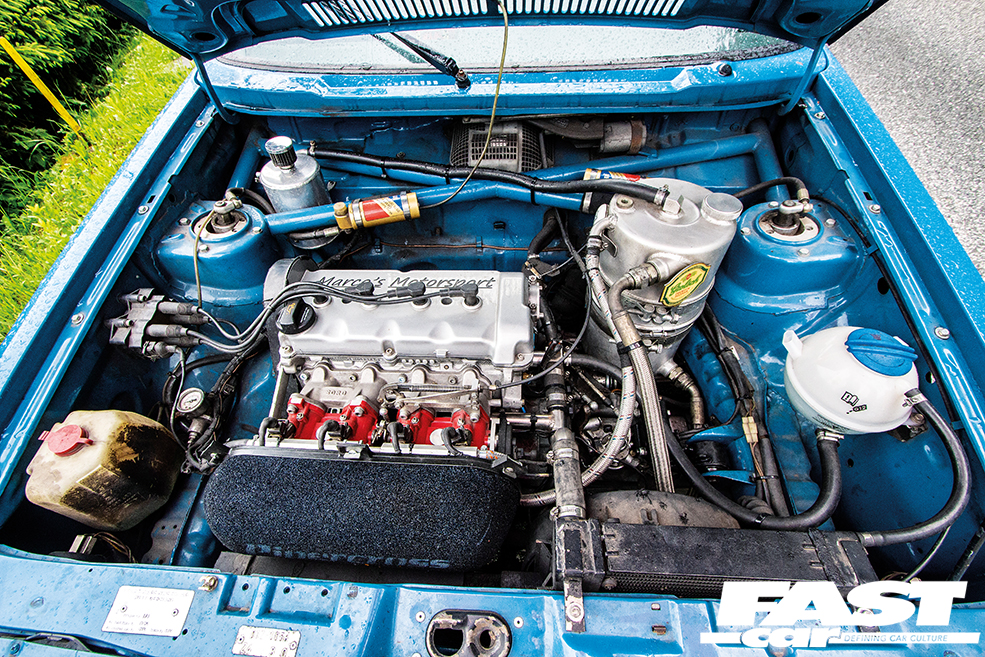
“This car is everything a normally aspirated shouty Mk1 Golf track car should be”
With a current 252 horsepower, 8500 max rpm, 16-valve 9A 2.1-litre motor running plus-60mm per side track and a set of Group 2 – aka ‘Berg arches’ – to cover the wheels, this car is now over 2000 laps at the ‘Ring in its current form, and another 1000 before the 2007 rebuild. Marco reflects “I stopped counting.” Translating to over 40,000 miles (62,500 kms), that’s hardly surprising. Stop the freakin’ bus!
So, 252bhp and 280 NM of torque – 206 lb ft – out of an aspirated 16-valve on a budget this side of a 25,000 Euro, Lehmann Motoren-Technik factory Golf or Ibiza crate motor is some achievement, as anyone who tunes these motors knows. Part of that is due to the extra capacity from a diesel 95.5 mm crank – who says big cranks don’t rev? – and an 83.5 mm bore which combine to give an extra five percent capacity. Breathing through larger valves also helps, as does the dry sump external oil pump system to eliminate losses from oil sloshing around the crank, plus a special coating on the cylinder bores to reduce friction and give free horsepower, as Marco explains: “the low friction brings more torque. 252 bhp is not the max. I can go higher to 265/270 but then my torque goes down and at the Nürburgring I want to have maximum torque, so that is why I only drive 252 horsepower!” Clever, and not surprising. When I asked Audi Head of Engine Development Ulrich Baretsky how they got over 300 bhp out of this 16-valve engine used in the ‘90s A4 Super Touring cars, his first and only answer was “friction”.
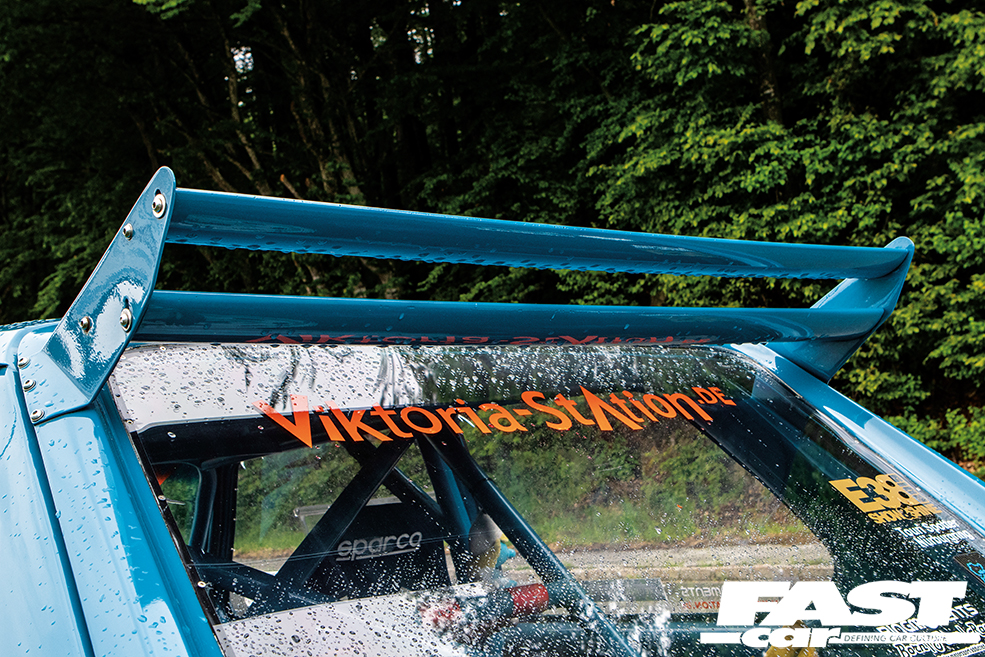
The rest appears outwardly fairly conventional with high compression pistons, Cat Cams with solid lifters plus lash caps and vernier adjustable pulleys on both ends. Considering Marco builds this himself, the results are mighty impressive. “Now every two years I change the crank and conrod bearings. Every four years I take the motor out of the car and change nearly everything.” He clearly knows his stuff: “On Facebook ‘Marco’s Motorsport’ there’s a couple of engines that I built. It’s a bit of fun for me.” Marco uses Dutch legend Jeroen Dik: “At the start of my journey I visited many mappers. For nearly 20 years I now go to JD Engineering.”
Power is transmitted through the familiar 02A cable-change ‘box converted to fore-aft sequential style shifting via an SQS lever. “The 6-speed gear kit is from Quaife. I’ve driven it since April 2007, I know my Quaife and I know what the problems are with it and it is fine for me. It’s a change box with a Drenth plate LSD.”
This is now, but back in 2007, running an earlier-spec 231 bhp 1.9 litre wet-sumped 16-valve engine, a story of shenanigans with the ‘Ring marshals started. Those familiar will be aware of the annual rumours of track rule reinforcements, likely to affect the legions of thinly-veiled road-legal race cars, all enjoying the best tarmac – and concrete – in the world. “On the first day we drove, the Friday before Easter in 2007, we were sent away because of my plastic windscreen. The next day, the Saturday, we came back again and got the track guys of the Nürburgring across to the parking lot and I showed him my front window because I didn’t want to be sent away again.”
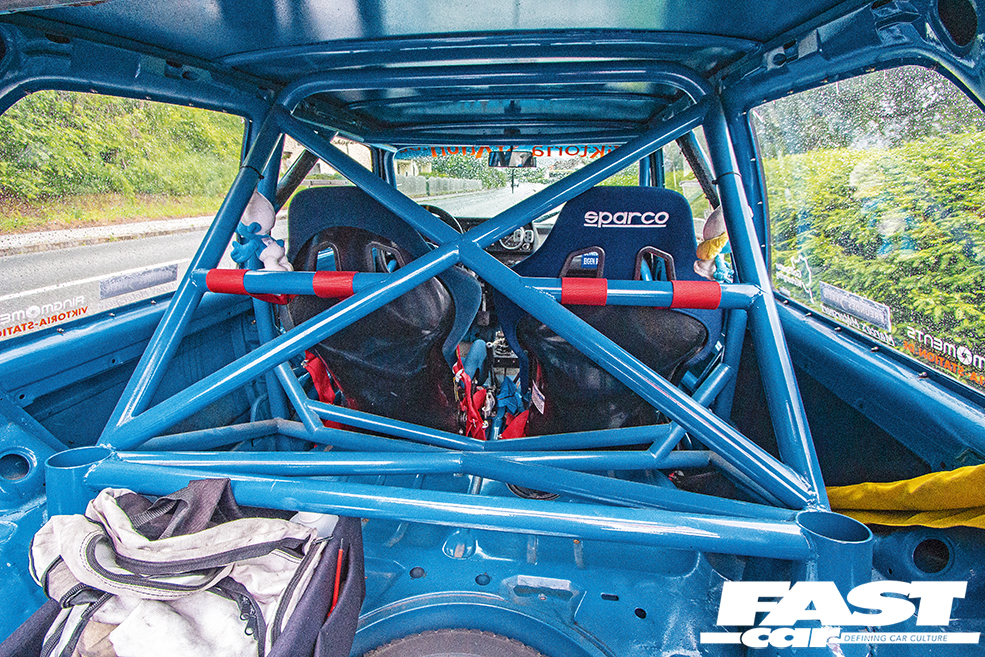
Ultimately the Golf was still too often the attention of the marshals. “At the end of 2007 I was banned from the ‘Ring because my car did not conform to the German rules.” The only solution? “Rebuild it and run with German licence plates.” Re-registering it in Germany at Marco’s girlfriend’s for a year was the way forward, and he went through the car with a fine toothcomb to re-spec it and get it TUV inspected. All sounding a bit serious? Well aside from catching up with Marco in Worthersee, during the last 13 years, Marco has driven two other tracks: Zandvoort and Spa, but the ‘Ring does it for him: “Every other circuit compared to the ‘Ring? You can’t. The ‘Ring is it!!!”
Getting the car TUV approved was some challenge. “I changed a lot of things so I could drive within the German law. If you don’t have it on paper, it’s not allowed.” Throwing in a first aid kit was the easy bit. Its German logbook lists endless modifications from the Proflex dampers, to the Sparco seats, to the Fifft white tint rear lights. The driver’s Sparco bucket seat had to be put on an adjustable rail, and the 55mm rear stub axle spacers had to be re-made from steel not aluminium! The rear spoiler blades had to be re-worked in glass fibre, and the one off extended steering column replaced with one with a more safety-conscious production version from a Mitsubishi Colt along with column stalks. The hydraulic handbrake had to be supplemented with a cable actuated one, which uses a fourth pedal in the driver’s footwell! Even grip tape had to be put on the Tilton bias pedal box pedals. More obscurely the vent from the under-bonnet dry sump tank had to go to a catch tank with a filter. “After this period the ‘Ring marshals know me and my car. I have no problems anymore. Since late 2008 the car has been back on a Holland version of the TUV, an ‘APK’. ”
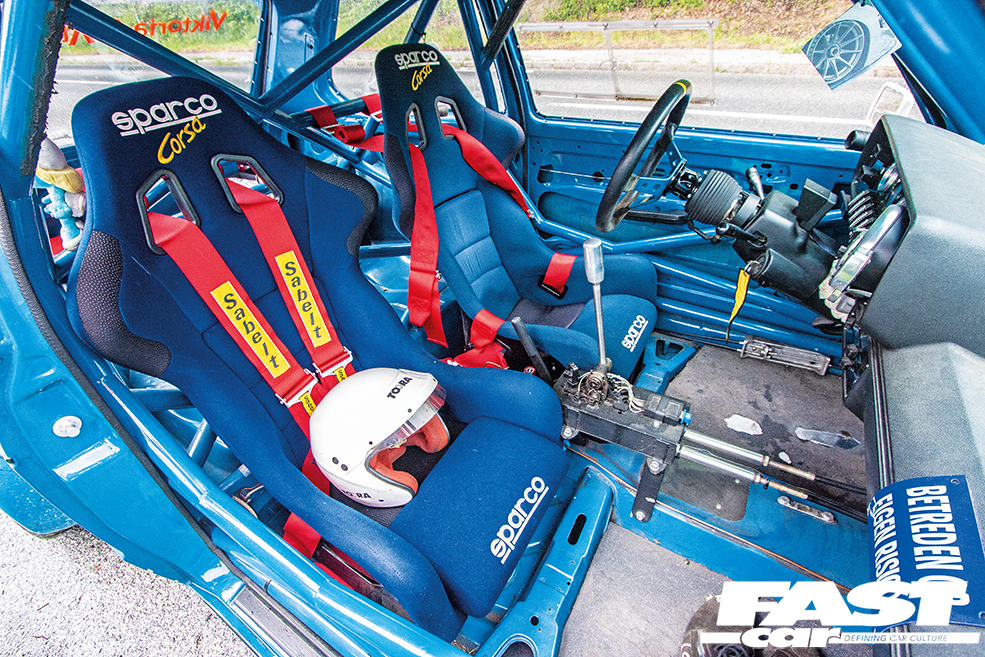
So against the odds Marco’s done what only the minority do: stuck with the same car for a long time and the whole journey has long gone past being just track days. “For me when I go to Breidscheid, at the half-way entrance, it’s all like a family. We have all respect because we are all there for one thing: that is having fun on the ‘Ring. Nothing more, nothing less. You can’t win anything.
So, how quick is this Golf, roughly? “Laptimes is really not important for me, fun to drive is important. Let’s say it does under eight minute laps.” Eat your heart out, Jeremy Clarkson! Marco cautions though: “You see a lot of guys buying one or two laps and in those two laps they have to drive like Formula 1 stars. No. For us it is about having fun. Having fun is 100%, and driving is 50% and a chat with the guys and driving with along with the other guys is also 50%.”
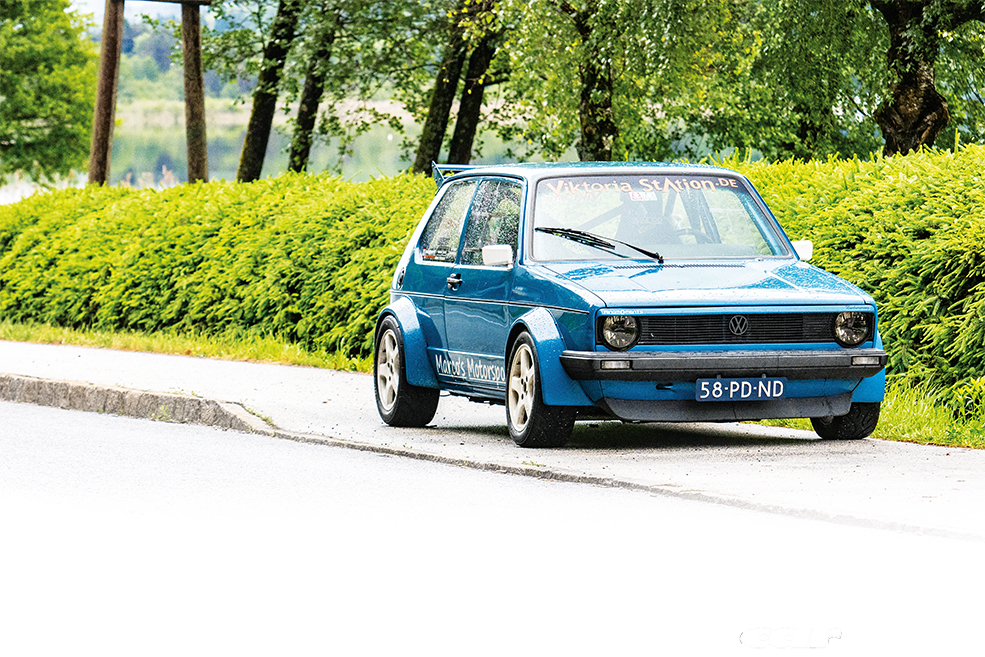
So it seems Marco’s got a hang of the engineering as well as the talent bit too. Special moments? “It is very difficult to mention a few favourite laps. I have a friend there who drives a Mk2 Golf 1.8 turbo. We have the same speed so when we do a lap it is tough driving! Normally I have to drive in front so he can chase me. Always lovely laps. There are not that many because he is only there for five times a year.”
“There is another one encounter to mention. There is the guy whose driven the BMW M5 ‘Ring Taxi for the past few years and when I see the car, I go after it. Sometimes he is waiting for me! I am always thinking to myself: ‘what is he telling his passengers?!!’ ‘Oh yeah, there’s the blue Mk1 that is coming so let’s wait and let’s drive together ??’ It’s fun and also a respect thing. The ‘Ring Taxi was the car to beat with my Mk1 and I did it many times.”
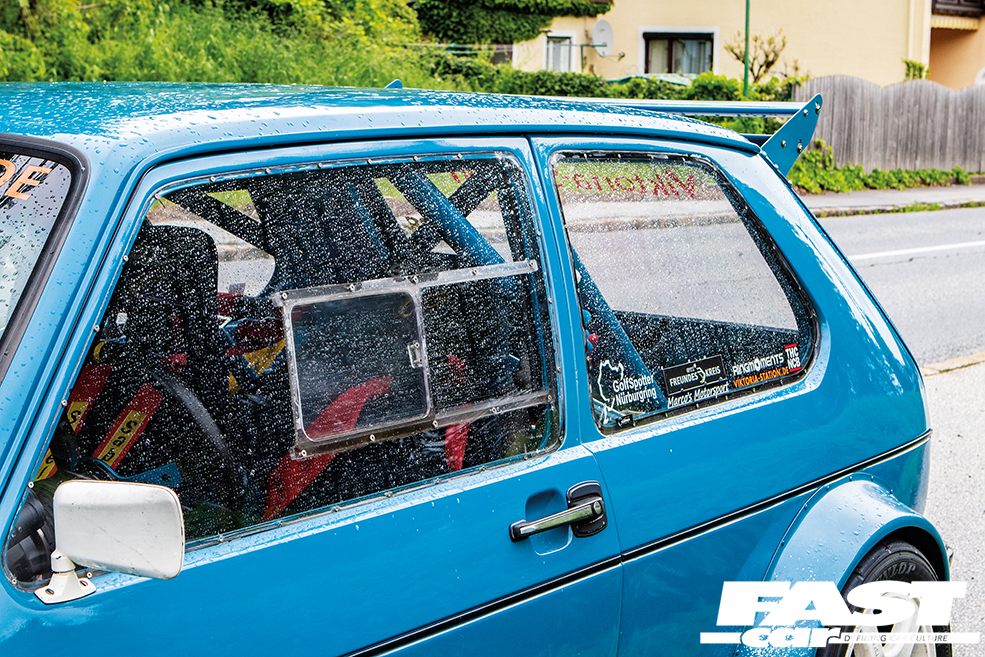
In those years of pounding the Green Hell tarmac, Marco’s had a couple of scrapes: “In October 2014 I lost my left front wheel and crashed at 140 km/h into the barrier.” The joint between the hub and wishbone broke, resulting in the left hand side of the car getting severely damaged as well as the front corner. Marco reflects: “The roll cage did its job.” – and likely saved the car. “Then in July 2016 I lost my left back wheel. No big damage” – a rear stub axle sheared, which is on YouTube.
Years of track bashing, but like any true race car that ever earned its spurs, this Mk1 has pedigree and provenance not just because it of its track time, not just because it fast, or because its humbled all manner of other cars, but because it’s also had its calamities and yet bounced back better than ever.
So why does Marco still drive a Mk1? “I love it, you don’t see a lot of Mk1s, and many people like it. When you look at the ‘Ring nowadays, it is all turbo engines. There are also a lot of GT3 Porsches, BMW E36s, E46s and E92s but there are not many forty-year old cars driving on the track. Sure it’s very tiring to drive with only manual steering – after the jump the car is very unstable – but driving it fast makes a lot of fun for me and for the visitors. They know the car, they know it’s fast and when they see the blue Golf, they indicate to the right!”
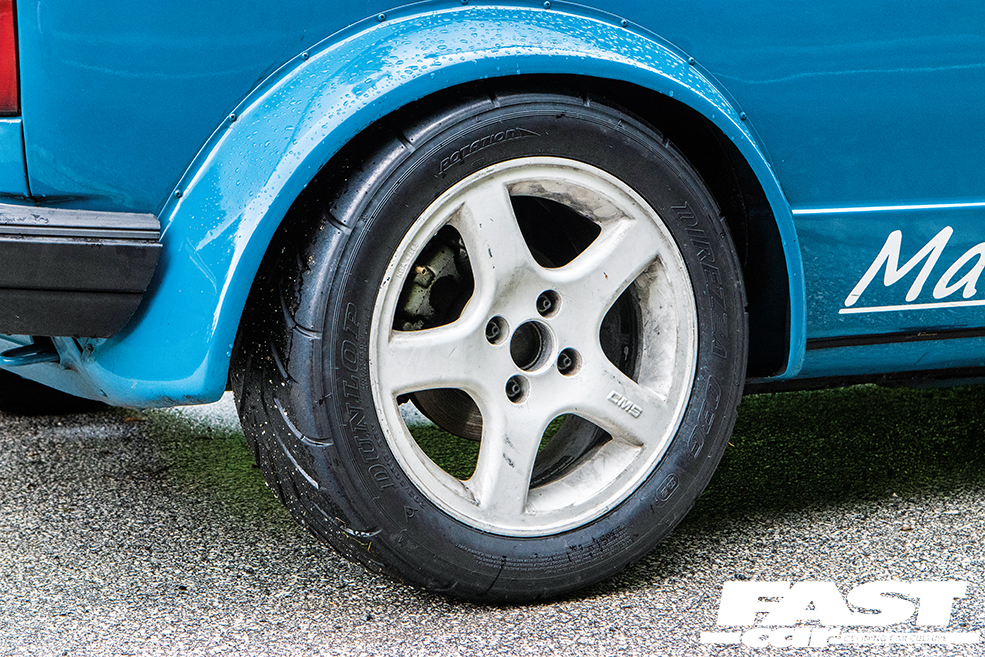
And here’s the clincher: “I have many people who say ‘I was a passenger in a BMW M5 or in other big cars, you know, Ferrari or Porsches or something like that, but when I ride with you, it’s working, it’s hot, it’s noisy, it goes through your bones’. When you are in a GT3, it’s going fast, very fast, but emotionally it’s not the same as driving a noisy Mk1.” So there you have the survey from a panel of random ‘Ring passenger hailers.
Maybe it’s just me but I never tire of watching the original Mk1 Golf GTI shape, wide arches or not, punching above its weight, showing the rest how it’s done. And Marco’s Mk1 embodies everything about that. Taking one of the oldest cars and putting on the line for all to see. A mix of engineering, skill, sticking with it, reaping all the benefits of continued development and gaining respect for putting it out there and showing what can be achieved. In the end, it’s not how much money you spent, or what spec you ordered. It’s how much of a scene you create, how much ingenuity you came up with, how much fun you had and how much you inspired others. And when you start out as an underdog only to deliver in spades, prestige goes out the window, speed and skill takes centre stage. The true speed and visceral test is utterly class-less.
So if ever you’re at the ‘Ring car park on a Touristenfahrten day, you know what to do: ask nicely, buckle up and enjoy the ride. I’ve booked my spot.
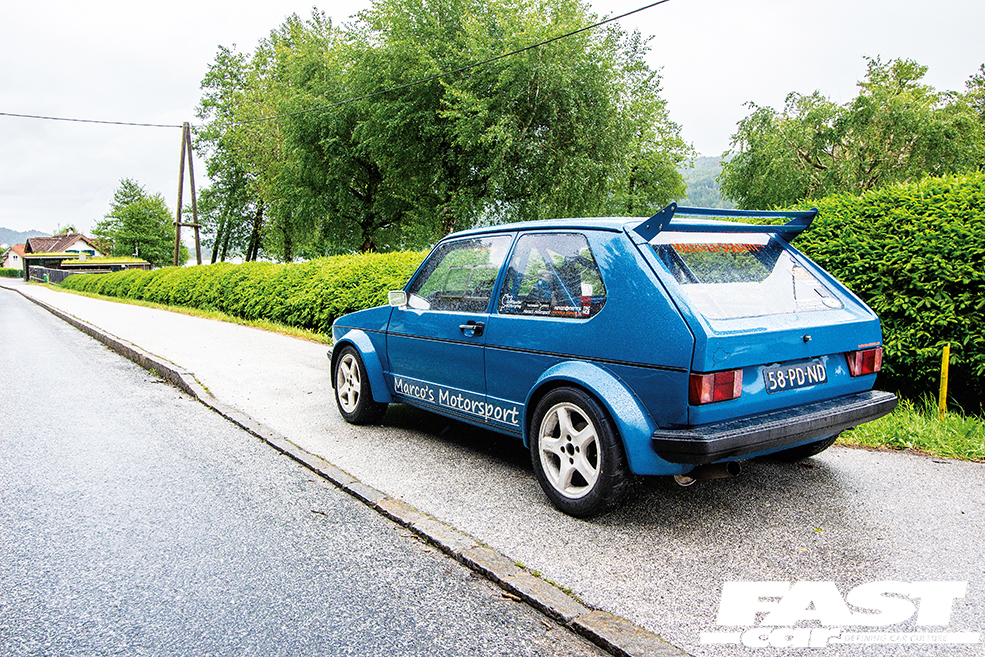
Tech Spec: Mk1 Golf track car
Engine:
All-steel, dry-sumped, 9A-code Golf 2.1-litre 16v, mapped by JD Engineering. ABF 373’D’ head, 95.5mm 1Z diesel crank, 83.5mm Wossner high-compression forged pistons, giving 2092cc. Low friction engine bore cylinder coating, 144mm Carillo rods, Cat Cams, solid tappets, external and inter-cam adjustable vernier pulleys, oversized Honda valves, uprated valve springs, Lumenition 45mm ITBs, Sorg Motorsport inlet manifold, Jenvey fuel rail, Bosch Audi S3 injectors, Pipercross air filter, MBE 992 ECU, distributor blanked, wasted spark coil pack, external crank sensor-triggered spark timing, Mk1 Golf K-Jet fuel pump, Pace 10 litre engine-bay-mounted oil tank, Pace external oil pump (no oil cooler), Marco’s Motorsport self-built 4-2-1 exhaust manifold, with flexible spring fittings at the head, Marco’s Motorsport 2.5-inch/63mm stainless steel exhaust system with upswept tail pipe. Sachs RCS200 200mm basket clutch with a locally made single sintered disc (non-paddle) and home-made lightened flywheel. Quaife QKE2V close-ratio semi-helical-tooth 6-speed 02A dog ‘box, Drenth plate limited slip differential, spherical-jointed shifter tower linkage. Bespoke lengthened chrome moly driveshafts with BMW inner and Audi outer joints. Performance: 252bhp and 280 NM torque. Max revs 8500 rpm
Chassis:
7×15” CMS wheels with Dunlop Direzza 205/50 03G tyres, recently upgraded to 7×17” wheels with Kumho Ecsta V70a tyres. Stud and nut conversion, Brembo Seat Ibiza 4-pot front callipers, 280mm diameter front discs now upgraded to 323mm, mounted to roll-centre optimised modified Golf Mk2 hubs, Carbon Lorraine RC8 sintered brake pads, 6N Polo/Ibiza rear stub axles and discs (upgraded post-wheel off incident). 72-position 3-way front and 48 position 2-way rear external canister adjustable Proflex shocks complete with home-made front spherical eccentric suspension top mounts, Eibach anti roll bars, home-made +60mm wide-track tubular wishbones, widened rear axle via 55mm steel stub axle spacers, all bushes replaced with spherical bearings, braided brake hoses, manual steering rack with lengthened outer joint for wider track
Exterior:
Germany-sourced 1979 Mk1 Golf Series 1 shell painted in RAL5009 blue. Simon Gras / quattratuning.nl wide arch Group 2 aka ‘Berg Cup’ arches, tubbed inner rear arches, polycarbonate side and rear windows complete with door sliders and without OE rubbers, relocated flag mirrors, eyebrow spoiler, JOM cross-hair smoked headlamps, clear front indicators, single front wiper, Fifft rear lights, deleted rear wiper, home-made twin-plane adjustable-rake rear spoiler
Interior:
Sparco Corsa bucket seats, Sabelt 3-point 3 inch harnesses, carbon dash inlay panel with minimalist clocks, Autometer rev counter, OMP steering wheel, 1990 Mitsubishi Colt longer steering column, indicator and windscreen wiper levers, gear indicator on ignition cowling, shift light, large oil pressure light, raised SQS non-flatshift sequential gear shifter, Tilton three-cylinder bias brake pedal box, between-seats bias adjuster, hydraulic handbrake, extra fourth pedal for mechanical handbrake for TUV rules, grip tape covered pedals and floor plates, battery box in boot, plus the all-important yellow flag for marshalling ‘Ring track incidents. Seam welded with all underseal removed, multi-point weld-in CDS 2.5mm-wall roll cage to front turrets, with extra sill tubes + lower bulkhead protection, harness bars and chassis bracing triangulation in lower rear.
Contact:
‘Marco Veldhuis’, ‘Marcos Motorsport’, ‘widebodyallstars’. Instagram: ‘fliegende_hollanderr’

